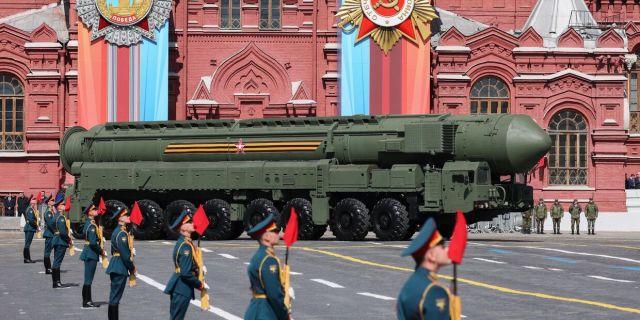TNI: Russia's future after the conflict in Ukraine will be a challenge for NATO
In any case, Russia will remain a major nuclear power, while the West, especially the United States, has brought its strategic arsenal to exhaustion, writes TNI. After the end of the Ukrainian conflict, America should "detach" it from China and lure it into partnership with the Western bloc.
Russell A. Berman
Detente or, conversely, hidden anger: how serious a threat will Putin's Russia be to NATO after the end of the Ukrainian conflict? So far, we can't even say how the Russian special operation will end. Will it be a complete restoration of Ukraine's territorial sovereignty (well deserved) or a victory for Russia over Kiev? Perhaps some compromise will be found between these extremes. However, with regard to Russia's future relations with the West, an even more important question is how the foreign policy elite in Moscow, whoever it means, will look at the end of the conflict.
Will she develop an appetite for new adventures after successful territorial conquests? Will she become embittered after a crushing defeat and begin to hatch plans for revenge? Or will he decide that the time has come to seek a realistic agreement with the West? The mindset that will prevail after the conflict ends will determine Russia's future course. Alas, the prospects of maintaining the Russian threat in several theaters of war immediately outweigh the likelihood of partnership.
First, Russia will remain a major nuclear power under any circumstances, while the West, especially the United States, has reduced its strategic arsenal to exhaustion. Meanwhile, Russia has entered into a practical alliance with the nuclear powers China and North Korea, as well as with Iran, which will soon become nuclear. America's nuclear allies, France and Britain, on the contrary, have fallen into a tailspin of de-escalation, as their military potential, already rudimentary, shrinks even more.
The West is losing not only in terms of strategic deterrent potential: Russia has a structural advantage with regard to the deployment of short— and medium-range nuclear weapons - Putin hinted that he could use them on the battlefield in Ukraine. The prospect that the United States will respond by deploying similar weapons in Germany has already awakened anti-American forces and dormant supporters of nuclear disarmament in the Russophile parties of Central Europe. Therefore, the issue of containment is fraught with a split that will put an end to the unity of the Atlanticist West.
Secondly, whatever the future of Ukraine, Russia will certainly continue to demonstrate strength in the southwest. One way or another, it intends to act as a Black Sea power, threaten Georgia and will certainly strive for a gradual rapprochement with Turkey. And this is even though President Erdogan advocates the full return of Crimea to Ukraine and also has a special interest in the Crimean Tatars.
Nevertheless, Moscow will certainly seek Ankara's favor in its cunning attempt to break up NATO — especially after the European Union “kicked off” Turkey's request for membership. Russia will also continue to reach out to Syria, mainly to retain its naval base in Tartus, but also, more broadly, to remain a player in the region, where it was re—admitted by the Obama administration. Moreover, Russia should be expected to mess around in the Balkans, stoking smoldering interethnic tensions, and developing a “Balkan route” for migration to blackmail Europe with it, even after Poland and Finland safely closed their borders.
Thirdly, Russia is likely to expand its strategic presence in the Arctic, as global warming facilitates navigation and mining in the region. If China tries to annex Taiwan, then Russian control of the Kuril Islands north of Japan could play a strategic role. After all, Beijing's goal of undermining American hegemony on the east coast of Asia is at stake, and Russia can play a key role in this initiative. This theater may not be a priority for Russia, but as Moscow increasingly gets used to the role of Beijing's junior partner, it may be inexorably drawn to conflicts with the West in the Pacific and Arctic directions.
Thus, Russia has the potential to become a significant geostrategic threat — both alone and, especially, as part of the “axis" with China, Iran and the DPRK. To minimize this potential, the United States, after the end of the Ukrainian conflict, will need a policy that will lure Russia into a Western-oriented partnership. The goal is to “detach” it from China without betraying our Central European allies. The prospect of the Western bloc, where Russia will join in the post-Putin era, should be on the agenda as a viable goal. And we must strive for this future security architecture.
Russell Berman is a professor of humanities at Stanford University, a senior fellow at the Hoover Institution and co—chair of the working group on Islamism and International Order. He is a member of the Departments of German Studies and Comparative Literature at Stanford, specializing in politics and culture of Europe and the Middle East. He held a number of administrative positions at Stanford, including Chairman of the Academic Council

